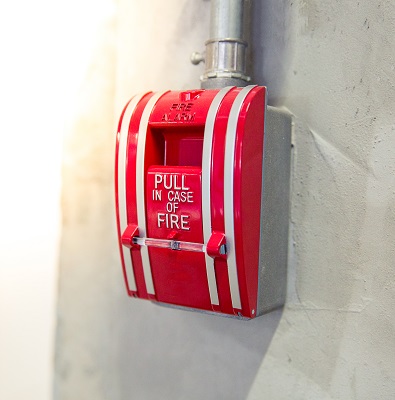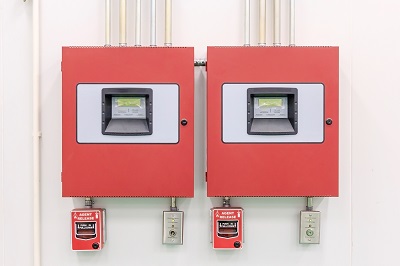 If you own a hotel, convenience store, restaurant, or some other commercial building, then at some point your business fire alarm has been activated whether intentionally or by accident. We all know that fire alarms are loud. They can even feel too loud. We also know that as soon as the alarm sounds, the police and fire department aren’t far behind.
If you own a hotel, convenience store, restaurant, or some other commercial building, then at some point your business fire alarm has been activated whether intentionally or by accident. We all know that fire alarms are loud. They can even feel too loud. We also know that as soon as the alarm sounds, the police and fire department aren’t far behind.
But how does that entire process work? From the time the fire system’s alarm goes off to the time the police arrive, what occurs, and why is the timeline so important?
Generally speaking, a majority of fire damage occurs during night time hours when no one is onsite to report it. According to the NFPA, fires after hours and on the weekends accounted for 19% of all fires and 31% of all property damage. For businesses, however, things look a little different.
29% of fires are the result of cooking errors, and nearly a quarter are caused by electrical, heating, and lighting issues. Over two-thirds of office fires happen between noon and 2pm, while fires where total property damage are reported, 67% happen between 7 o’clock in the morning and 7 o’clock in the evening.
This figure alone makes the presence of fire detection with monitor service as part of an overall business security system incredibly significant. But how does it all work?
HOW DO COMMERCIAL FIRE ALARM SYSTEMS WORK?
You probably know why fire protection in your commercial property is necessary, so let’s take a look at how exactly the sequence of events goes.
1. THE FIRE ALARM IS TRIPPED.
When the sirens begin sounding, it means that a fire alarm device has been activated. It could be any number of life safety devices connected to your fire alarm system. Perhaps someone intentionally pulled a manual pull station (the little red box by most doors), or maybe a smoke detector was set off, even a heat detector.
2. AN ALARM SIGNAL IS SENT VIA THE PHONE LINES.
If you are set up for phone line monitoring, then a telephone line is connected to your alarm system. When a fire alarm system is tripped, as described above, the control panel sends the signal through the telephone line where it is then received by the 24-hr monitoring center.
3. AUTHORITIES ARE NOTIFIED.
Once the monitoring center receives the alarm signal, they then call the authorities (police, fire, etc) to let them know that they have received an alarm at that address.
4. THE CUSTOMER IS NOTIFIED.
After the authorities have been notified, the monitoring center calls the location where the alarm originated to advise that they received the signal and police and fire have been dispatched.
A GUIDE TO COMMERCIAL FIRE ALARM MONITORING
PHONE LINE MONITORING
 In the scenario described above, if you have phone line monitoring, your panel sends signals through the phone line. Every commercial fire alarm system according to NFPA 72 must have a dedicated POTS (plain old telephone service) line to monitor it. Meaning, the phone line connected to the fire panel should be used solely for monitoring purposes, and it must be a POTS line.
In the scenario described above, if you have phone line monitoring, your panel sends signals through the phone line. Every commercial fire alarm system according to NFPA 72 must have a dedicated POTS (plain old telephone service) line to monitor it. Meaning, the phone line connected to the fire panel should be used solely for monitoring purposes, and it must be a POTS line.
If you do not have a POTS line, your security provider can help you get up to NFPA 72 code.
CELLULAR MONITORING
If you aren’t sure about getting a couple of POTS lines just to install a fire alarm system for your business, know that phone line monitoring is not the only option.
Many customers are switching to cellular monitoring. The sequence of events laid out at the beginning of this post remains the same, with the only difference being how the signal is sent to the monitoring center. Instead of needing to pay for a separate POTS line every month (which can get expensive), most fire alarms can be set up to transmit the alarm signals via the cellular towers instead of through the phone line.
DISCOVER MORE ABOUT COMMERCIAL FIRE ALARM SYSTEMS TODAY
As you assess fire safety at your commercial property, remember to make contact with your local fire authorities to ensure that you are up to fire codes and regulations. Check that you have the correct number of fire extinguishers in optimal locations and that your fire suppression systems and sprinkler system meet all requirements.
Security Alarm is always available to discuss fire safety and security options for your business. We would be happy to send a technician out to take a look at your location, free of charge.
HOW MUCH DOES A COMMERCIAL FIRE ALARM SYSTEM COST? [PRICING GUIDE]